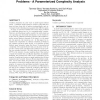Free Online Productivity Tools
i2Speak
i2Symbol
i2OCR
iTex2Img
iWeb2Print
iWeb2Shot
i2Type
iPdf2Split
iPdf2Merge
i2Bopomofo
i2Arabic
i2Style
i2Image
i2PDF
iLatex2Rtf
Sci2ools
ATAL
2009
Springer
2009
Springer
Easy and hard coalition resource game formation problems: a parameterized complexity analysis
Coalition formation is a key topic in multi–agent systems (mas). Coalitions enable agents to achieve goals that they may not have been able to achieve independently, and encourages resource sharing among agents with different goals. A range of previous studies have found that problems in coalitional games tend to be computationally complex. However, such hardness results consider the entire input as one, ignoring any structural information on the instances. In the case of coalition formation problems, this bundles together several distinct elements of the input, e.g. the agent set, the goal set, the resources, etc. In this paper we reexamine the complexity of coalition formation problems in the coalition resources game model, as a function of their distinct input elements, using the theory of parameterized complexity. The analysis shows that not all parts of the input are created equal, and that many instances of the problem are actually tractable. We show that the problems are FPT...
Artificial Intelligence | ATAL 2009 | Coalition | Coalition Formation | Coalition Formation Problems |
Related Content
| Added | 26 May 2010 |
| Updated | 26 May 2010 |
| Type | Conference |
| Year | 2009 |
| Where | ATAL |
| Authors | Tammar Shrot, Yonatan Aumann, Sarit Kraus |
Comments (0)

